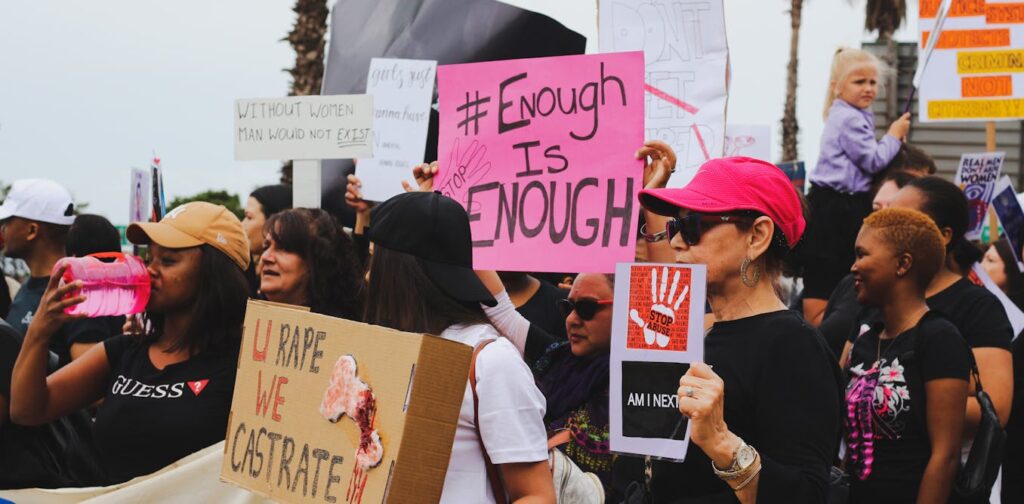When South Africa became a democracy in 1994, a primary goal was to grant citizenship rights to all its people, in particular, to give the majority black South Africans rights they had been denied during colonialism and apartheid. This included the right to vote.
Apartheid segregated the population into ethnic groups. All but people classified as white were stripped of their rights. The 1996 constitution conferred upon citizens civil liberties such as the right to vote, movement, association and free speech as well as substantive rights such as access to land, health, education and employment.
But, as I argue in the Palgrave Handbook of Gender and Citizenship, full citizenship is about more than a legal status that grants rights. Full citizenship also means being able to fully participate in a society.
Based on my research into South African politics and gender politics over the past three decades I argue in a recent chapter that women in South Africa don’t enjoy full citizenship because they face endemic gender-based violence.
Sexual violence against women has become normalised in South Africa. Everyday spaces are filled with violence, as indicated by the South African Police Service’s quarterly crime statistics.
I conclude in the book chapter that people who feel excluded turn to protest to claim their rights as citizens. In doing so they become activist citizens.
Acts of citizenship can occur in many different places – on streets, in courts, at borders, or even through media. They can happen on different scales, from local community action to international movements. These acts may involve protests, organising campaigns, or using digital media to spread awareness. People engaging in these acts might demand a wide range of rights, including political, social, sexual, ecological, or cultural rights.
While legal frameworks to enhance citizenship have changed over the past 30 years in South Africa, deep-seated inequalities and exclusions persist. Law reform cannot address high levels of unemployment (that need to be rectified through economic growth), neither can it address poverty that is endemic because of the legacies of apartheid, such as the exclusion from decent education and health care.
Acts of citizenship – whether through protest (such as service delivery protest), art, or everyday actions – continue to play a crucial role in expanding the boundaries of who is considered a citizen and what rights citizens can claim.
By understanding citizenship as something that is actively performed and claimed, rather than simply granted, society can better appreciate the ongoing struggles for equality and recognition.
Acts of citizenship
Emotions play a significant role in these citizenship actions, a concept known as “affective citizenship”. Expressions of fear, happiness, loneliness, anger, or grief can all be part of how people assert their rights and demand recognition. These emotional displays can be disruptive or more conventional, but they all focus on exclusions from citizenship.
Some acts of citizenship involve a “politics of refusal” – rejecting unfair conditions or norms. This refusal can expose hidden issues within citizenship, such as specific forms of gendered violence or discrimination. By disrupting “business as usual”, these acts force society to confront uncomfortable truths.
It’s important to note that acts of citizenship aren’t always large-scale or dramatic. They can also involve everyday actions that challenge norms or assert rights in smaller ways. What matters is that these acts transform the actors from passive subjects into active citizens claiming their rights.
Examples include the #EndRapeCulture campaign of 2016, when women protested against pervasive sexual violence on university campuses. At the same time, transgender students also protested against marginalisation.
Both groups of students used naked protests to show their refusal to be treated as though they were not citizens. Through their campaign, the students rejected behaviour and attitudes that normalise sexual violence on campuses.
Women students disrupted public spaces by protesting topless or in their underwear, sometimes brandishing sjamboks (plastic whips). These actions expressed anger at university authorities’ failure to address sexual violence. The activists were refusing to be treated as though they were not citizens.
By using their bodies in these acts of citizenship the protesters made visible the rage many South African women feel about sexual violence committed with seeming impunity. They highlighted how women’s bodies are vulnerable to violence due to neglect by authorities in implementing their own laws, such as the Sexual Offences Act and the Domestic Violence Act.
Read more:
Victory for women’s rights in Ghana as affirmative action law is passed – what must happen next
For its part the Trans Collective, a group of transgender students at the University of Cape Town, used a provocative art intervention to highlight the erasure or the making invisible of transgender experiences within the broader student movement during the same 2016 period.
They smeared red paint on photographs at an exhibit about student activism and used their naked, paint-covered bodies to block the entrance of the art gallery at the university to force visitors to confront the physical reality of how transgender rights are often “trampled” or ignored, even within progressive movements.
Impact
Acts of citizenship – whether through naked protests, art interventions, or other forms of activism – serve multiple purposes:
-
They make visible groups and issues that are overlooked or deliberately ignored.
-
They challenge conventional understandings of how citizens should behave or what citizenship looks like.
-
They create new spaces for political action and discourse.
-
They force society and authorities to confront uncomfortable truths about exclusion and violence.
-
They assert the agency of marginalised groups in defining and claiming their rights.
This article was originally published by a theconversation.com . Read the Original article here. .


